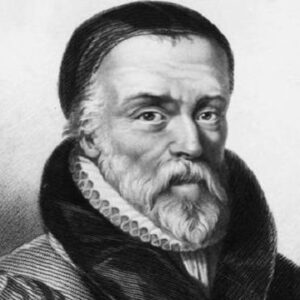William Tyndale was an English scholar and theologian best known for his work on the English translation of the Bible. His work, as a talented linguist, was praised after his death and was used in later Bible translations. Tyndale was born in England and studied at the Universities of Oxford and Cambridge, where he became a fervent proponent of church reform. He was a big believer in allowing people to read the Bible in their own language and was eager to translate it into English. He was ordained as a priest and appointed as a chaplain, but his divisive views alarmed church leaders. Tyndale then proceeded to London, and then to Germany, with the purpose of translating the New Testament into English, which was illegal at the time. After completing and printing his English New Testament, copies were sneaked into England and denounced by Roman Catholic authorities. After being accused of heresy, Tyndale went into hiding for a few years. He afterward relocated to Belgium, where he was apprehended by imperial authorities. He was found guilty of heresy and sentenced to death by strangulation and stake burning. King Henry VIII released the English ‘Great Bible,’ based on Tyndale’s work, just a few years after his execution. His outstanding effort served as the foundation for all later English Bible translations and had a significant impact on the evolution of the English language.
Childhood and Adolescence
William Tyndale was born in Melksham Court, Stinchcombe, a village near Dursley in Gloucestershire, England, in the year 1494. During the ‘War of the Roses,’ his family may have migrated to Gloucestershire under the name Hychyns.
William entered Oxford University’s Magdalen College School in 1506 and received his B.A. in 1512.
Tyndale studied theology after receiving his Master of Arts degree in 1515 and became fluent in multiple languages, including French, German, Italian, Latin, and Spanish.
He regularly chastised the idea that one had to study for so long before being allowed to study the Bible when studying theology. He also tried to form Bible study groups with friends who shared his interests during his undergraduate years.
Later the Years
Between 1517 to 1521, he was a professor of Greek at the University of Cambridge. He became even more convinced while at Cambridge that the Bible alone should govern the church’s customs and teachings, and that every follower should be able to read the Bible in his native language.
Tyndale was eager to translate the New Testament into English because he believed that doing so would allow the general population to understand scripture without having to go through the church’s filter. He also contended that the Bible contradicted the church’s belief that they were the earthly body of Christ.
He left Cambridge in 1521 to become the chaplain at Sir John Walsh’s residence in Little Sodbury. Shortly after, he was chastised by fellow churchmen for his extreme views, so he fled to London in 1523 with the hopes of translating the Bible into English.
He couldn’t get approval to translate the Bible into English in London, and the ecclesiastical authorities in England forbade him from doing so. Tyndale preached in London for the following few months, with financial help from Humphrey Monmouth, a wealthy London textile dealer.
In 1524, he left England for Germany after failing to gain any support or aid in achieving his goal. He arrived in Germany and made brief stops in Hamburg and Wittenberg before settling in Cologne.
Tyndale finished the New Testament translation in July 1525, and after the suppression of Catholic authorities, it was published in Cologne and then Worms. The first copies arrived in England the next year, where they were quickly condemned as heretical and publicly burned at St. Paul’s Cross.
In 1530, he published the Practice of Prelates, an essay that condemned Henry VIII’s marital annulment. When the King of England learned of it, he was outraged and ordered Tyndale’s imprisonment.
Tyndale then went into hiding for some years until being apprehended in Antwerp, Belgium. He was then found guilty of heresy and put to death.
Following King Henry VIII’s orders, a number of English translations of the Bible were produced within a few years of Tyndale’s death, many of which were strongly based on Tyndale’s original translations.
Major Projects of William Tyndale
William Tyndale is well known for his monumental labor of translating the Bible into English so that the general public might read the Holy Scriptures. He also inserted new phrases and words into the English translations while translating, which proved to be rather popular. His work was later included in many notable Bible translations, the most famous of which is the Authorized Version, or King James Bible.
Personal History and Legacy
Tyndale was betrayed by his companion Henry Philips and turned over to the imperial authorities in Belgium in 1535 after several years of hiding. Following his conviction on a charge of heresy, he was burned at the stake outside Brussels, Brabant, on October 6, 1536.
Tyndale’s amazing achievement provided the basis for most later English translations, as his translation of the Bible was the first to be printed in English.
Estimated net worth
The estimated net worth of William Tyndale is unknown.


